-
Helping policymakers plan for sea level rise
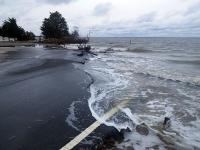
A new study could help protect more than thirteen million American homes that will be threatened by rising sea levels by the end of the century. It is the first major study to assess the risk from rising seas using year 2100 population forecasts for all 319 coastal counties in the continental U.S. Previous impact assessments use current population figures to assess long-term effects of coastal flooding. The data can help policymakers develop practical adaptation strategies for protecting land threatened by frequent and repeated inundation.
-
-
Microwave repairs might annihilate zombie potholes once and for all
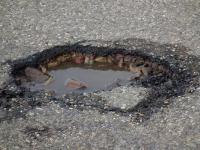
Some potholes are like zombies – they never die. Or at least that’s the perception of much of the driving public, especially as we enter peak pothole season: late winter and early spring. Recurring “zombie” potholes are too often a reflection of the type of method that’s used to patch or “fix” them – many of which are short-lived and only marginally effective. Researchers around the world are working to develop better and longer lasting repair alternatives. Microwave technology is not yet a routine method of repair, and it’s best-suited for potholes in asphalt rather than concrete. But this approach merits further consideration. After all, given our nation’s aging network of roads, zombie potholes will continue to flourish. Microwave repair could be an effective method for keeping them at bay.
-
-
New rule permits STEM graduates to stay in U.S. for 36 months
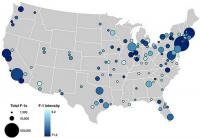
A new rule published by DHS this week allows foreign students in science and technology to extend their stay in the United States under the Optional Practical Training (OPT) program. The new rule will go into effect in May, and it will allow STEM graduates to stay and work in the United States for up to thirty-six months.
-
-
New laser-based aircraft tracking system to aid in disaster relief efforts
A ground-breaking tracking system called HYPERION, based on eye-safe lasers, could enable aircraft, unmanned aerial vehicles (UAVs), and even orbiting satellites to transmit vital data to ground stations more securely, quickly and efficiently. HYPERION, offering major benefits compared with the traditional radio frequency (RF) data transmission systems currently relied on in the UAV sector, could allow UAVs engaged in disaster monitoring, surveying, search and rescue, and other humanitarian missions to send detailed images more rapidly back to the ground for analysis.
-
-
Warmer spring temperatures reduce Colorado River flows
Warmer-than-average spring temperatures reduce upper Colorado River flows more than previously recognized, according to a new report. The study, the first to examine the instrumental historical record, discovers that temperature has played a larger role in streamflow and in exacerbating drought since the 1980s.
-
-
Miniaturized fuel cell makes drones fly more than one hour
Drones are used for various applications such as aero picturing, disaster recovery, and delivering. Despite attracting attention as a new growth area, the biggest problem of drones is its small battery capacity and limited flight time of less than an hour. A newly developed fuel cell can solve this problem.
-
-
Sea level rise threatens more people than earlier estimated
It is estimated that 1.9 billion inhabitants, or 28 percent of the world’s total population, live closer than 100 km from the coast in areas less than 100 meters above the present sea level. By 2050 the number of people in that zone is predicted to increase to 2.4 billion. These people are the most vulnerable to the rise of the sea level as well as to the increased number of floods and intensified storms.
-
-
Global warming increases rainfall in world's driest areas
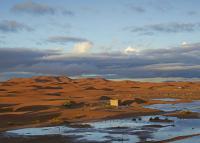
Global warming will increase rainfall in some of the world’s driest areas over land, with not only the wet getting wetter but the dry getting wetter as well — a phenomenon that could lead to more flash flooding.
-
-
DARPA announces VTOL X-Plane Phase 2 design
For decades, aircraft designers seeking to improve vertical takeoff and landing (VTOL) capabilities have endured a substantial set of interrelated challenges. Dozens of attempts have been made to increase top speed without sacrificing range, efficiency or the ability to do useful work, with each effort struggling or failing in one way or another. DARPA says that its VTOL Experimental Plane (VTOL X-Plane) program aims to overcome these challenges through innovative cross-pollination between fixed-wing and rotary-wing technologies.
-
-
Are America's cities prepared for extreme weather events?
Infrastructure is, by design, largely unnoticed until it breaks and service fails. It is the water supply, the gas lines, bridges and dams, phone lines and cell towers, roads and culverts, train lines and railways, and the electric grid; all of the complex systems that keep our society and economy running. Engineers typically design systems to withstand reasonable worst-case conditions based on historical records; for example, an engineer builds a bridge strong enough to withstand floods based on historical rainfall and flooding. But what happens when the worst case is no longer bad enough?
-
-
Senior defense officials discuss arctic, Antarctic science and research
To address the need for collaborative research in the Polar Regions, Chief of Naval Research Rear Adm. Mat Winter met in Finland two weeks ago with counterparts from five nations in a first-ever gathering of senior defense officials to coordinate science and technology research in high latitudes. While the U.S. Navy has long experience with polar operations, changing climates present new challenges — particularly for surface ships, as new water passages open up.
-
-
Impact of climate change on agriculture may be underestimated
Studies of how climate change might affect agriculture generally look only at crop yields — the amount of product harvested from a given unit of land. But climate change may also influence how much land people choose to farm and the number of crops they plant each growing season. A new study takes all of these variables into account, and suggests researchers may be underestimating the total effect of climate change on the world’s food supply.
-
-
Seeding iron on the Pacific’s floor may not pull carbon from air as thought
Scientists plumbing the depths of the central equatorial Pacific Ocean have found ancient sediments suggesting that one proposed way to mitigate climate warming — fertilizing the oceans with iron to produce more carbon-eating algae — may not necessarily work as envisioned.
-
-
Four African innovators selected for engineering innovation prize
Following an open, competitive, application process which saw entries from fifteen countries in sub-Saharan Africa, twelve African entrepreneurs were chosen to receive a package of six months of business training and mentoring from the U.K.’s Royal Academy of Engineering. The four finalists showing the greatest promise have now been chosen, and are in with a chance to become the overall winner. Each will receive at least £10,000 with the grand prize of £25,000 to be awarded at a ceremony in Cape Town on 1 June. A low-cost sustainable water filter system to provide clean and safe drinking water, and a service that allows African mobile phone users to switch easily between multiple mobile networks are among the four African innovations selected by the Academy.
-
-
Syria’s 1998-2012 drought likely its most severe in more than 900 years
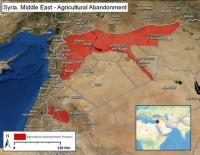
In the years before the Syrian conflict erupted, the region’s worst drought on record set in across the Levant, destroying crops and restricting water supplies in the already water-stressed region. A new study shows that that drought, from 1998 to 2012, was not just the most severe in a century of record-keeping — it was the Levant’s most severe drought in at least 500 years and likely more than 900 years.
-
More headlines
The long view
New Technology is Keeping the Skies Safe
DHS S&T Baggage, Cargo, and People Screening (BCP) Program develops state-of-the-art screening solutions to help secure airspace, communities, and borders
Factories First: Winning the Drone War Before It Starts
Wars are won by factories before they are won on the battlefield,Martin C. Feldmann writes, noting that the United States lacks the manufacturing depth for the coming drone age. Rectifying this situation “will take far more than procurement tweaks,” Feldmann writes. “It demands a national-level, wartime-scale industrial mobilization.”
How Artificial General Intelligence Could Affect the Rise and Fall of Nations
Visions for potential AGI futures: A new report from RAND aims to stimulate thinking among policymakers about possible impacts of the development of artificial general intelligence (AGI) on geopolitics and the world order.
Smaller Nuclear Reactors Spark Renewed Interest in a Once-Shunned Energy Source
In the past two years, half the states have taken action to promote nuclear power, from creating nuclear task forces to integrating nuclear into long-term energy plans.
Keeping the Lights on with Nuclear Waste: Radiochemistry Transforms Nuclear Waste into Strategic Materials
How UNLV radiochemistry is pioneering the future of energy in the Southwest by salvaging strategic materials from nuclear dumps –and making it safe.
Model Predicts Long-Term Effects of Nuclear Waste on Underground Disposal Systems
The simulations matched results from an underground lab experiment in Switzerland, suggesting modeling could be used to validate the safety of nuclear disposal sites.
